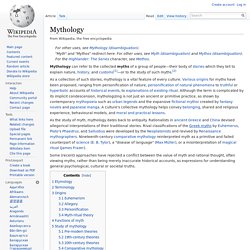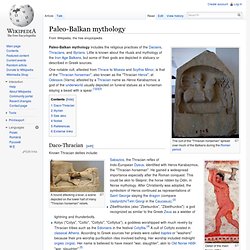

Encyclopedia Mythica. Wiki. Some (recent) approaches have rejected a conflict between the value of myth and rational thought, often viewing myths, rather than being merely inaccurate historical accounts, as expressions for understanding general psychological, cultural or societal truths.

Etymology[edit] The English term mythology predates the word myth by centuries.[5] It appeared in the 15th century,[7] borrowed whole from Middle French mythologie. The word mythology "exposition of myths" comes from Middle French mythologie, from Late Latin mythologia, from Greek μυθολογία mythologia "legendary lore, a telling of mythic legends; a legend, story, tale," from μῦθος mythos "myth" and -λογία -logia "study. "[8][9] Both terms translated the subject of Fulgentius's 5th-century Mythologiæ, which was concerned with the explication of Greek and Roman stories about their gods.
Terminology[edit] Origins[edit] Euhemerism[edit] Allegory[edit] Some theories propose that myths began as allegories. Heroes of History - The Heroic Monomyth. As of July 1, 2013 ThinkQuest has been discontinued.

We would like to thank everyone for being a part of the ThinkQuest global community: Students - For your limitless creativity and innovation, which inspires us all. Teachers - For your passion in guiding students on their quest. Partners - For your unwavering support and evangelism. Parents - For supporting the use of technology not only as an instrument of learning, but as a means of creating knowledge.
We encourage everyone to continue to “Think, Create and Collaborate,” unleashing the power of technology to teach, share, and inspire. Best wishes, The Oracle Education Foundation. List of mythologies. This is a list of mythologies of the world, by culture and region.

Mythologies by region[edit] Africa[edit] Central Africa[edit] East Africa[edit] Horn of Africa[edit] Somali mythology North Africa[edit] West Africa[edit] Southern Africa[edit] Arctic[edit] overlaps with North Asia, Northern Europe and North America. Asia[edit] Southwestern Asia[edit] Middle East, Persia, Anatolia, Caucasus. Ancient Medieval to Modern. Portal:Mythology.
Asian. Chinese. Japanese. British Isles. Celtic. Irish. Scottish. Welsh. Egyption. Greek. Roman. Paleo-Balkan mythology. The cult of the "Thracian horseman" spread over much of the Balkans during the Roman period.

Paleo-Balkan mythology includes the religious practices of the Dacians, Thracians, and Illyrians. Little is known about the rituals and mythology of the Iron Age Balkans, but some of their gods are depicted in statuary or described in Greek sources. One notable cult, attested from Thrace to Moesia and Scythia Minor, is that of the "Thracian horseman", also known as the "Thracian Heros", at Odessos (Varna) attested by a Thracian name as Heros Karabazmos, a god of the underworld usually depicted on funeral statues as a horseman slaying a beast with a spear.[1][2][3] Daco-Thracian[edit] A hound attacking a boar, a scene depicted on the lower half of many "Thracian horseman" reliefs.
Known Thracian deities include: Sabazios, the Thracian reflex of Indo-European Dyeus, identified with Heros Karabazmos, the "Thracian horseman". Known Dacian theonyms include:
Norse. Indo-Euro. Indian. Indigous.